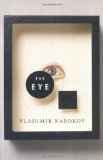Book Review: “The Eye” by Vladimir Nabokov
November 25, 2010
I read Nabokov’s fourth novel this past weekend (and quite quickly—it’s a novella) and the connective tissue bonding his Russian works is starting to become manifest. In Mary we were introduced to the Russian emigré crowd; in King, Queen, Knave: grotesque love and the faulty sense of self-worth; in The Luzhin Defense the obsessive swapping of reality with dream-state. The Eye pulls in pieces of all these themes and toys around with a few more, not the least of which is the nature of our existence and a personality as refractive of the perceptions of those around it.
That is, can we ever know ourselves—can we ever exist?—as, really, all we are all, as Luzhin contemplates in The Defense: “…as in two mirrors reflecting a candle…only a vista of converging lights…” Luzhin here, too, realizes to some degree that we may all just be the incomplete sum of all of our own reflections off of others’ beliefs of us.
Oh, there is also a story here, nominally a metaphysical detective plot. Heady stuff for a mere 100 pages. I’m starting to doubt I exist.
In The Eye we continue our acquaintance with the generally jovial, mostly borgeois and slightly boorish collection of Russian emigrés. We feel how Nabokov was once part of this motley culture, at once an echo of the Motherland and an aspiring intelligentsia with (sometimes silly) cosmopolitan goals. We first get introduced to this community in Mary. Its importance was less central in King, Queen, Knave (a more German feel) and The Luzhin Defense (slightly more Russian). But it’s back perforce in The Eye and will continue on into his next novel chronologically: Glory (at least, based on what I’ve read of the back flap).
Our narrator is a peevish young man in Berlin, a recent Russian immigrant who is serving as the tutor to some snotnosed young boys. He hates it. Despite the lack of anything morally substantial in his life, he seems a preening, over-confident dandy. He takes up with a slightly sloppy mistress, whose husband wises to the liaison and gives the protagonist a summary beating—in front of his pupils. Mortified, he shoots himself.
Now ostensibly dead, he spends the following three-quarters of the story living a dream-like extension of the same life. He becomes obsessed with the identity of a young man named Smurov. We’re told that Smurov is a fair, wonderful, temperature man who is impeccably well-spoken and generally sensitive. Almost immediately, Smurov’s actions belie this and we’re left with the duty of deciding what is really happening, or what it means for something to really happen, or, anyway, to peel through the conceit of the narrator’s own life and identity.
In the narrator’s opinion, Smurov only exists as others see him to exist, through their own keyhole perspective into his existence. Each person has their own Smurov-image: pompous fool, liar, latent homosexual, weird, would-be suitor.
The narrator explains: We think of ourselves as a knowable collection of things, but, really, we’re unbounded, there is no snapshot of knowing that anyone can bundle up. We’re all fragmentary refractions of others’ glimpses of us (or even unglimpsed shards we will never know about?), unknowable, reduced to the anecdotes and opinions of our observers, which disperse like steam after our corporeal existence ends.
As the narrator unfolds Smurov from different angles, he wrangles with other human conditions, stumbling through the agony and ecstasy of unrequited love along the way. We don’t care, alas, because his character is so repellant as to make him laughable, not pitiable. Or is it just that we think we understand the narrator’s smug shallowness because we’ve seen 100 pages of its description? Maybe the reader, just like any of the individual watchers of Smurov (or the watcher of the watchers of Smurov) think we know the entirety of him, but merely know one fragment in time, from one specific perch.
Nabokov progress is now 7 of 18 novels!
Get the Book!
Buy the books mentioned in this post from Amazon.com now and help me maintain my rock 'n roll lifestyle.
Related Posts
- Book Review: “The Defense” by Vladimir Nabokov
November 22, 2010 - Book Review: “King, Queen, Knave” by Vladimir Nabokov
January 25, 2010 - Book Review: “Mary” by Vladimir Nabokov
December 21, 2009 - Book Review: “The Ballad of the Sad Cafe” by Carson McCullers
January 8, 2009 - Book Review: “Wolf Hall” by Hilary Mantel
January 14, 2010

